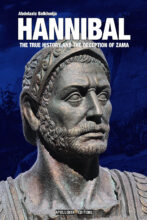One has to grasp the real weight of the Barcid family as well as the actual power of Carthaginian senators, to better understand prevailing relations between the two factions.
This enduring bitter relationship led oligarchs in power to betray Hamilcar Barca at the end of the First Punic War, then his son Hannibal at the end of the Second Punic War.
Power in Carthage had been for centuries the exclusive domain of extremely wealthy oligarchs, who had powerful commercial networks in numerous cities over the entire western Mediterranean, and who preferred the government of Carthage to be weak and at their mercy.
Hamilcar, was the natural leader of the Reformers’ Party, whose goal was a more powerful state, able to defend the Republic of Carthage against the repeated assaults of a hegemonic Rome, and he was the hero of the Sicilian War. After his victory in the Mercenary War he had the possibility of seizing power, but he had a greater vision and broader aims. He had negotiated with his Conservative adversaries his withdrawal from political life, in return for a reform which granted the army the choice of its chief. This reform had considerable consequences over subsequent events.
After having divested the oligarchs from their control over the army, Hamilcar, new commander-in-chief, elected by the military staff and supported by the People’s Assembly, had occupied the rich Iberian Peninsula and founded an Iberian-Carthaginian state, with Akra Leuka as its capital. We need to creditably gauge the significance of this major development project that enabled Carthage both to compensate for her lost territories, as well as to acquire the military and financial means to defend herself against Rome’s imperialistic surges, which had caused her to be deprived of Sicily, Sardinia and Corsica, thus destroying her trading system.
After Hamilcar’s death, the wealthy Iberian-Carthaginian state further expanded and prospered, under the leadership of his son-in-law Hasdrubal the Fair, who founded the new capital Cartagena. Then his son Hannibal extended its area of influence, while marking his power with a federal imprint.
In 218 when Rome declared war, Hannibal was not a mere general but a head of state, as well as a military commander in charge of the entire area of Carthaginian influence, from the Gulf of Sirte in Libya to the Pyrenees. Actually, Hannibal was at that time much more powerful than all the leaders of the metropolis reunited, and he managed the Carthaginian-Iberian state whose revenues were as substantial as those of the Republic of Carthage.
All this should be borne in mind when speaking of the Second Punic War. The wealthy and powerful senators, supporters of the old Carthaginian parliamentary system which left little power to the executive, dreaded the Barcids’ personal power. The latter had indeed set up a new state, whose structure and administrative efficiency had nothing in common with those of the old Carthaginian regime.

Hannibal: The True History and the Deception of Zama (English Edition)

